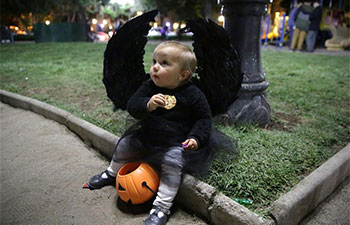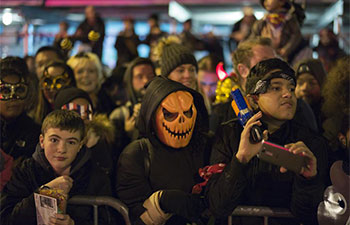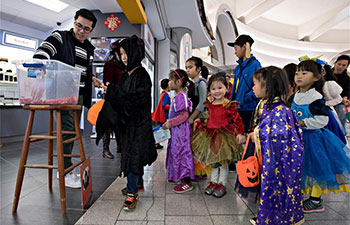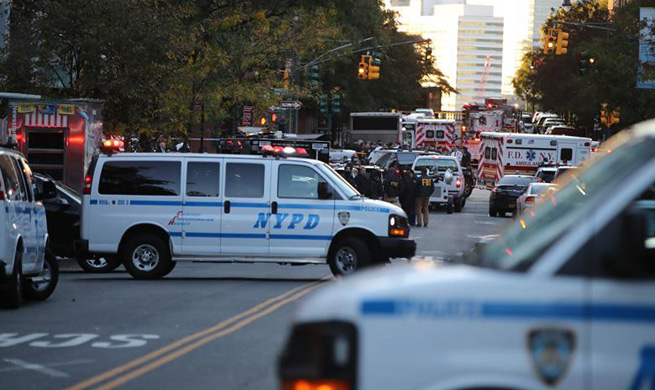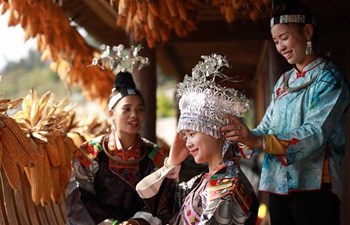MEXICO CITY, Nov. 1 (Xinhua) -- U.S. pop culture is a force to be reckoned with. Perhaps no country knows this better than Mexico, which shares a porous 3,200-km border with its northern neighbor.
The social and political influence of the United States in the country has always been felt, but it grew more visible in 1994, when Mexico signed the North American Free Trade Agreement (NAFTA) and threw open its borders to U.S. imports.
Upon that, stores were awash with U.S.-made goods and Mexican consumers fell in step with the rhythm of America's seasonal shopping sprees: gifts for Christmas, party favors for New Year, cards and candy for Valentine's Day, beachwear for summer vacations, knapsacks and other supplies for going "Back to School" in September, and costumes and ghoulish decorations for Halloween in October.
Occurring so close to Mexico's iconic Day of the Dead celebration at the start of November, a time traditionally reserved for remembering family and friends who have passed away, Halloween was a particular concern. Many here are worried the Oct. 31 U.S. holiday would come to eclipse the Day of the Dead.
But it appears Mexicans have come to the conclusion that the two holidays are vastly different and theirs is better, or at least more meaningful.
"Halloween is their holiday and the Day of the Dead is ours," Araceli Loza, a resident of the central State of Mexico, told Xinhua during a visit to Mexico City on Tuesday.
"The Day of the Dead is a time to honor our dead. Halloween is about dressing up in fantastical costumes," said Loza, summing up the essential difference between the two and explaining why the Mexican holiday has not only persevered, but become more popular.
This year, it seemed that more major museums and cultural centers than ever before touted workshops and seminars, many aimed at kids, to learn about the significance of the holiday.
Weekend parades featured cultural icons associated with the Day of the Dead, most famously "La Catrina," a carnivalesque female skeleton in a broad-brimmed hat that gamely represents death.
At least one of the parades was directly inspired by the 2015 James Bond film "Spectre" -- which features a Hollywood version of Mexico's traditional celebration -- but that only shows that like Halloween, the Day of the Dead has universal appeal.
Across the Atlantic, London's Whitechapel Gallery, an art gallery that has been in business since 1901, on Tuesday invited the public to "celebrate the Mexican Day of the Dead with an evening of films, conversation and poetry."
In the U.S. heartland, Deseret News, the local daily of Salt Lake City, Utah, noted last week that "the Day of the Dead ... is about as Mexican as it gets, but this unique holiday has been gaining popularity outside of its native country for a while now."
While younger Mexicans have embraced Halloween -- because no children can resist an excuse to wear a costume and pretend to be someone else -- Mexico's deeply-rooted Day of the Dead is in no danger of extinction for now, and that is partly due to its significance.
According to the age-old tradition, which can be traced back hundreds if not thousands of years to Mexico's original indigenous civilizations, the spirits of the dead return to Earth at this time each year.
To welcome them back, families erect altars offering some of the things their dearly departed most enjoyed in life, like tacos or tequila, and perhaps a pack of cards or set of dominoes.
Altars feature candy skulls with the name of the deceased written across the forehead and those of surviving family members.
It helps that Mexico City and other urban centers have tapped into the Day of the Dead's tourism potential, and are investing to promote and preserve the holiday by organizing or sponsoring related events, including parades, exhibits and other events.
Stephen Miller, a New York architect currently visiting Mexico City, noted that the local tradition has been transformed "into a travel holiday geared towards foreigners."
"It's a total Day of the Dead immersion experience," Miller said.




